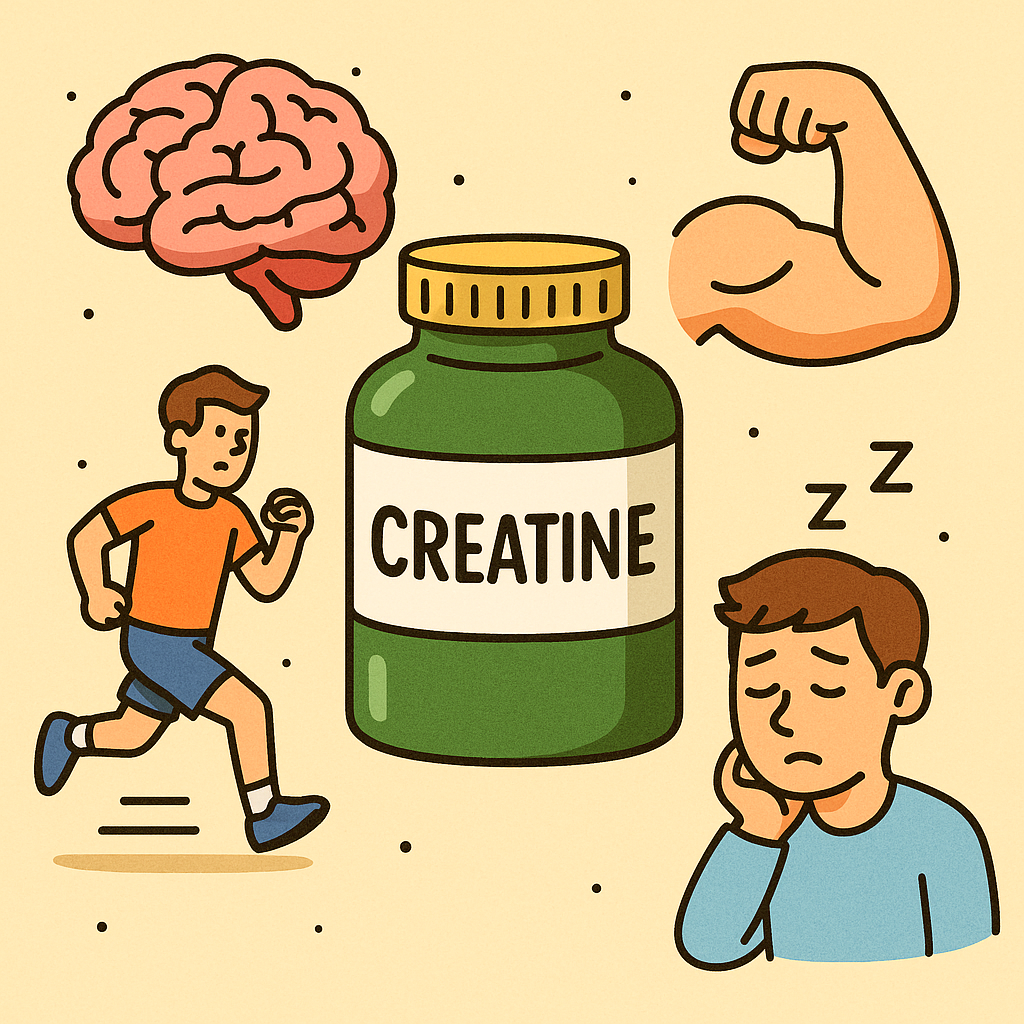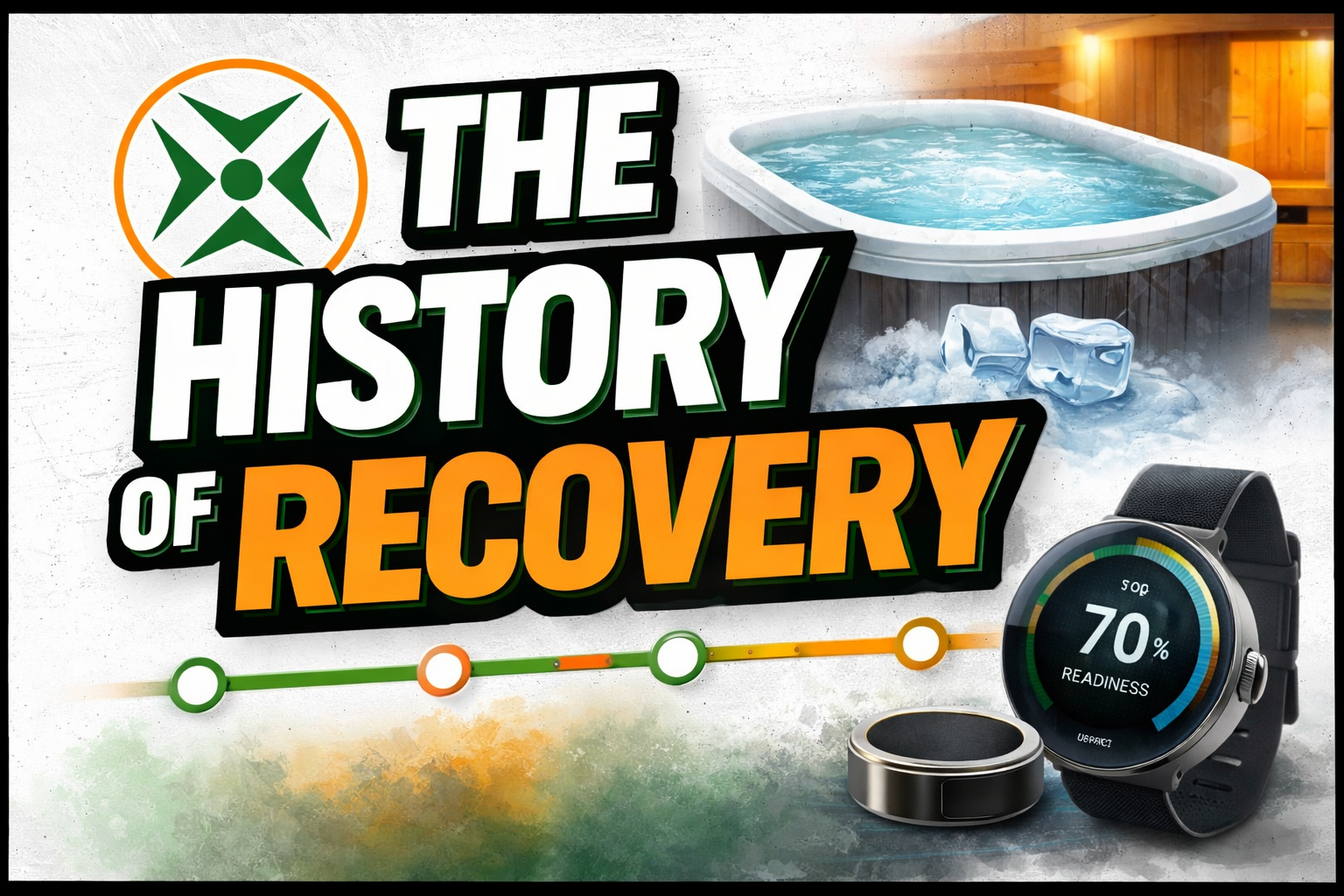Creatine: Everything You Need To Know
And Why This May Be The Most Important Supplement You're Not Taking

At Prototype Training Systems, we’re always looking for simple, proven tools that improve physical and mental performance.
Creatine is one of those tools—and honestly, I wish more people understood what it actually does and how beneficial it can be, so I decided to put together this extensive but easy-to-understand blog all about creatine.
Let’s break down what creatine is, how it works, and why it’s one of the best, safest, and most misunderstood supplements out there.
What is Creatine?
Creatine is a natural compound your body makes and stores in your muscles and brain. It's found in red meat, fish, and eggs—but not in the quantities that really move the needle.
When you take it as a supplement (typically as creatine monohydrate), it helps your body produce more ATP, which is your muscles' and brain’s primary fuel source during short, high-intensity efforts—like sprinting, lifting, or even deep thinking under stress.
Think of it like a battery pack. It helps you recharge faster between sets—and between thoughts.
Is it Safe? What’s the research say?
Creatine monohydrate has been one of the most studied supplements in sports and health science—over 1,000 clinical trials since the early 1990s. The International Society of Sports Nutrition (ISSN) confirms this volume—half a million servings have been consumed across these trials, and the only consistently noted effect was weight gain from retained water, not adverse health issues. [theguardian.]
A detailed review published just
three months ago states that more than
680 peer-reviewed clinical trials, involving over
12,800 participants, have been conducted on creatine. Doses ranged as high as
30 g/day over 14 years, across populations from infants to seniors—and safety has held firm throughout. [Frontiers.]
Some of the Largest & Most Impactful Studies
1. Long-Term Safety Review (1970s–2025)
A comprehensive overview published in 2025 analyzed hundreds of trials and thousands of participants. It evaluated high-dose protocols (up to 30 g/day over extended periods) across diverse age groups—even infants. Across the board, creatine was found to be safe and well-tolerated with no significant renal, muscular, or thermoregulatory issues in healthy individuals. [Frontiers.]
2. MDPI RCT (2025): 5 g/day, 13‑Week Trial, 63 Participants
This controlled trial assigned 63 people (~age 31 ± 8) to 5 g/day creatine monohydrate versus control. After a 7‑day wash-in, lean body mass increased by ~0.5 kg among women in the supplement group—but the gains plateaued by the end of 12 weeks during shared resistance training. It suggests women may experience more pronounced early lean-mass changes, though longer-term gains level between groups. [Discovery Journals]
3. Meta-Analyses and Systematic Reviews on Strength & Body Composition
Multiple large-scale reviews (e.g. MDPI scoping review, Springer meta-analysis, Sports Medicine reviews) consistently find ~1–2 kg additional lean mass and noticeable strength gains with creatine supplementation during resistance training, especially when combined with structured training protocols. [examine.com.]
4. Safety & Side Effects Analysis
A recent safety-focused study looked at creatine dosing across over 4–20 g/day in richly dated clinical trials spanning 1997–2022. Concerns like cramps, dehydration, and kidney stress were largely unfounded—differences between creatine and placebo groups were statistically insignificant or clinically negligible. [wikipedia.]
Physical Benefits: Strength, Power & Recovery
As you can see, Creatine is one of the most researched supplements in sports science—over 1,000 studies and counting. Here's what that latest research says:
- Increased lean mass & strength: Studies show an average lean mass gain of ~1.3kg and significant strength improvements when supplementing with creatine.
- Better training performance: It helps you squeeze out those extra 1–2 reps in your sets.
- Faster recovery: Creatine has anti-inflammatory properties that may reduce muscle damage post-training.
- Improved hydration: It pulls water into your cells—supporting muscular performance and recovery.
Whether you’re an experienced lifter or just starting out, creatine helps you get more out of your training.
Brain Benefits: Focus, Fatigue & Sleep Deprivation
Here’s where things get interesting.
Creatine is no longer just a gym supplement. Emerging research shows it also supports cognitive performance, especially under stress, sleep deprivation, or mental fatigue.
One 2024 study found that a single high dose (~0.35g/kg) of creatine restored processing speed and short-term memory in sleep-deprived adults for up to 9 hours. Think: all-nighters, new parent fatigue, or long days in front of a screen.
Other studies show improved reaction time, working memory, and even mood in older adults, vegetarians, and anyone under high cognitive demand. It’s becoming a go-to supplement for mental clarity and resilience, not just biceps.
What’s New in Creatine Research (2025)
1. Comprehensive Systematic Reviews & Meta-Analyses
- A recent Frontiers in Nutrition systematic review confirmed that creatine monohydrate enhances both muscle performance and cognitive function across diverse age groups, including older adults. [The Times]
- Another literature review covering trials from the past decade reported significant improvements in lean body mass (~+1.3 kg) and strength, along with modest but meaningful gains in memory—especially in older individuals. [APCZ.]
2. Cognitive Resilience & Sleep Deprivation
- A landmark 2024 Randomized Controlled Trial from Germany (Forschungszentrum Jülich) found that a single high dose (≈ 0.35 g/kg body weight) of creatine significantly enhanced cognitive performance—processing speed, short‑term memory, and task accuracy—during a night of sleep deprivation. Effects began ~3 hours after ingestion, peaked at ~4 hours, and lasted up to ~9 hours. [sportsnutritionsociety.]
- Supporting biomarker data from a separate pilot study showed
elevated serum creatine levels post 24-hour wakefulness, suggesting increased creatine uptake or mobilization during cognitive stress.[ SpringerLink.]
- These findings mark creatine as a potential cognitive buffer during sleep loss—not as a substitute for rest, but as an acute support.
3. Brain Mechanisms & Neuroprotective Effects
- Research shows creatine supports both energy buffering (PCr/ATP cycles) and reduces inflammation and oxidative stress in muscle and brain tissues—supporting the emerging muscle‑brain axis. [Glamour.]
- Emerging neuroscience (Psychology Today, April 2025) links creatine to enhanced mitochondrial support, reduced neuroinflammation, and improved cellular resilience in aging brain tissue. [Psychology Today.]
4. Expanded Use in Women, Aging & Clinical Populations
- Clinical evidence now supports creatine supplementation in post‑menopausal women, pediatric patients with musculoskeletal or metabolic conditions, and seniors to support muscle, bone, and cognitive health—countering myths that creatine is unsafe in these populations.
[The TimesBusiness Insider.]
- Safety reviews based on over 680 clinical trials—including doses up to 30 g/day over long periods—report no serious adverse events, with very low incidence of mild side effects compared to placebo. [Frontiers.]
5. Broader Wellness & Longevity
- Business Insider (June 2025) highlights creatine’s growing role in longevity and healthy aging: improving heart health, cognitive resilience (including Alzheimer’s risk), mood regulation, and bone strength. Researchers characterize creatine as one of the most versatile and cost-effective supplements available (~$0.50 per serving). [Business Insider]
- Women’s Health (June 2025) and other sources reaffirm potential roles in hormonal balance, mood support, and everyday functional strength—even in non‑athletic users. [womenshealthmag.com.]
At-a-Glance: Key Research Takeaways
Physical performance
Increases lean mass + strength; consistently effective across age and gender groups
Cognitive & brain health
Enhances memory, processing speed, executive function; buffers sleep-related cognitive decline
Sleep deprivation resilience
Acute high-dose creatine can temporarily restore brain function even after extended wakefulness
Mechanistic insight
Supports mitochondrial energy buffering and reduces oxidative stress in tissues
Populations
Safe and beneficial in women, older adults, and clinical conditions (e.g. metabolic, muscular disorders)
Safety profile
Long-term use at doses up to 30 g/day is well-tolerated with minimal side effects
Longevity & healthspan
Emerging evidence for benefits on bone, mood, heart, and cognitive aging
Dosing: What Works, How to Start & Does It Matter When You Take It?
Research Snapshot
- A 2013 randomized trial comparing 5 g of creatine pre‑ vs. post‑workout found slightly greater gains in fat‑free mass and strength in the post-workout group, though the sample size was small and results should be interpreted cautiously. [Tom's Guide]
- A 2020 meta‑analysis reinforced this trend: post‑workout creatine appears to provide marginally better improvements in hypertrophy and body composition compared to pre‑workout dosing. [Macros]
- More recent summaries (e.g. Medical News Today, Health.com) report that taking creatine close to your workout—either before or after—may offer slight benefits, but emphasize that regular daily use remains the top priority. [Muscle & Strength]
- A summary from Sports Nutrition & ISSN found no significant differences in performance or recovery between pre and post dosing—and stressed that muscle saturation over time is what really matters. [Stats Pros]
Key Takeaways
✅ Primary takeaway: Daily consistency is the most important factor in creatine supplementation.
If you want to optimize around workouts:
- Post-workout may offer a slight edge in lean mass and strength gains.
- Pre-workout is still effective—especially to ensure you're hitting your daily dose reliably.
Practically speaking:
- Take 5 g post-workout, ideally with carbs and/or protein to support absorption.
- If that timing doesn’t work for you (e.g. off days or busy schedule), just take it anytime—morning, pre-, post-, or evening.
- On non-training days, dose at a time most consistent for you—timing isn’t critical on those days.
There’s a lot of talk around dosing—so let’s clear it up.
Standard Protocol
- 3–5g/day of creatine monohydrate
- No need to “load” unless you want faster results
- Take it any time of day—just be consistent
Higher Doses (5–10g/day)
- This is what I’ve been doing
- Heavier or more active folks may benefit from the upper range
- Split into 2 doses if you go over 5g to avoid GI discomfort
For Sleep-Deprived Days
- A one-time high dose (20g-30g) has been shown to restore cognitive performance
- Great for shift workers, new parents, or after a rough night of sleep
Important: Creatine is safe and well-tolerated. It doesn’t hurt your kidneys (myth!), and the water weight you gain is intracellular—not bloating.
Myths About Creatine—Busted
Let’s clear up some common misconceptions:
🚫
“It’s a steroid.”
Nope. It’s a naturally occurring amino acid compound—not a hormone, not a drug.
🚫
“It’ll make me bloated.”
Creatine draws water into your muscles, not under your skin. It supports performance—not puffiness.
🚫
“It’s just for guys or bodybuilders.”
Wrong again. Women, older adults, vegetarians, and even teenagers can all benefit—physically and mentally.
🚫
“You need to load or cycle it.”
You don’t. Daily low-dose works just as well over time.
What if you want to get your Creatine Naturally?
Creatine is naturally found in animal-based proteins, especially red meat and fish. However, the amount is relatively small compared to what you'd get from supplementation.
Top Creatine-Rich Foods (per 1 lb / ~450g serving)
- Beef (steak, ground)~2–2.5 grams
- Herring~3–4.5 grams
- Salmon~2 grams
- Tuna~1.5–2 grams
- Chicken~0.4 grams
- Pork~0.6–1 gram
- Eggs, Dairy, Plants-❌ Negligible
What This Means:
To get the commonly recommended 3–5 grams of creatine per day, you’d need to eat:
- 1.5–2 lbs of beef or salmon
- About 1 lb of herring (not exactly a meal prep staple)
- 6–8 chicken breasts (for ~3 grams total)
Why That’s Not Always Practical
- Cooking degrades creatine: Some is lost during heat exposure, so raw content is higher than what you absorb.
- It’s hard to sustain: You’d have to eat multiple pounds of meat daily to match the creatine in one $0.50 scoop of creatine monohydrate.
- Vegetarians/vegans get almost none from diet alone and show the biggest boost in brain and muscle creatine when supplemented.
Best Use of This Info
- If you're eating plenty of red meat and fish, you're getting some creatine—but likely not optimal levels for performance, recovery, or cognition.
- For most people, a small daily supplement (3–5g) is a cost-effective, efficient way to bridge the gap—especially if they’re not eating 1–2 lbs of meat per day.
Why I Use It—and Recommend You Do Too
Back in March, I added creatine back into my routine (5–10g daily). I’ve been taking it on and off since 2012, but never really liked the powders as I found them too sweet. Then I stumbled upon some gummies, which for me were just easy to take, I just keep them at my desk and pop them throughout the day!
A few weeks later in April 2025 , I pulled 560lbs on the deadlift. My best Deadlift of all time was in March 2022, 551lb that I did at our annual Lift Off event. A month later in May 2025—I pulled a 570lb deadlift at the Lift Off event again. That’s the heaviest I’ve ever lifted. And the kicker is: I didn’t train the deadlift any harder, just my normal routine of 4-5, 1 hour workouts a week of a blend of strength and conditioning.
But I was consistent with creatine.
To me, that’s the power of small, consistent changes stacked on top of a smart program. Creatine helps you recover faster, think sharper, and push a little harder without burning out. It’s practical, evidence-based, and low-effort.
How to Start Today
If you’re curious and want to give creatine a try, here’s what I would do if I was you:
✅
Start with 3–5g/day of creatine monohydrate
✅
Buy a reputable brand (NSF-certified, third-party tested)
✅
Take it daily with water—timing doesn’t matter as much as consistency
✅
Stick with it for at least 4–6 weeks and notice how you feel and perform
✅
Message me if you want help getting started
Bottom Line
I know there was a lot in here but Creatine is one of the most studied, safest, and effective supplements available—for strength, energy, and brain performance. And to add, there is more and more information coming out on the benefits. By the time this is posted, I wouldn't be surprised if there was even more!
It’s not just for gym bros. It’s for busy adults, thinkers, lifters, parents, and anyone who wants to move, think, and recover better.
If you have questions about dosing, timing, brands, or how it fits into your routine—just reach out. Let’s make smart training even smarter!
References & Recommended Reading
- Huberman Lab Podcast: “Creatine & Brain Performance”
- BMC Medicine: Creatine and Cognitive Function Meta-Analysis (2023)
- Frontiers in Nutrition: Creatine Supplementation & Cognition (2024)
- Neuroscience News: Sleep Deprivation Study on Creatine
- ISSN Position Stand on Creatine (2021)
Previous Blogs


Climb to New Heights
Prototype Training Systems is more than a gym - it is a lifestyle. Join us today!


